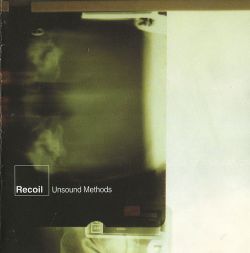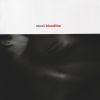Unsound Methods
| For information on this album's singles, see the Singles section. | |||||||||
|
|
| |||||||
| This article is about the album. To view a list of its songs and B-sides, see Unsound Methods songs. | |||||||||
Unsound Methods
| |

| |
| Album | Unsound Methods |
|---|---|
| By | Recoil |
| Catalogue number | CDSTUMM159 |
| Release date | October 27, 1997 |
| Recorded | September 1996 – June 1997 |
| Recorded at | The Thin Line (Sussex) |
| Produced by | Alan Wilder |
| Mixed | April–May 1997 |
| Mixing assistance | Paul Stevens Simon Shazell |
| Engineered by | Steve Lyon |
| Assistance / coordination | Hepzibah Sessa |
| Mastered by | Ian Cooper |
| Glass mastered at | Nimbus – C7055 |
| Published by | Mute Song Not Normal Music Zoetrope Music Company Carlin Music Corp. Chappell, Inc. Warner/Chappell Music Ltd. |
| Design | House |
| Designed at | Intro |
| Photography | Merton Gauster |
| Formats | EP, CD |
| Number of tracks | 9 |
Unsound Methods is the first studio album by Recoil and the first to be produced after Alan Wilder's departure from Depeche Mode in 1995. It was released on 27 October 1997 by Mute Records.
Track list
- Incubus
- Drifting
- Luscious Apparatus
- Stalker
- Red River Cargo
- Control Freak
- Missing Piece
- Last Breath
- Shunt
For a full list of songs, singles, and B-sides produced for this album, see the list of Unsound Methods songs.
Singles
- Drifting – 13 October 1997
- Stalker / Missing Piece – 9 March 1998
Quotes
Alan Wilder describes the events leading up to the production of Unsound Methods in the November 1997 issue of Orkus magazine:
I had been burned out completely. There were a couple of things in my life that I had to change, very important things. I got divorced, I became a father, I left the band - a lot of decisive things happened, and I was much happier than before when I finally left this tunnel behind. This was a good moment to work creatively again. My enthusiasm was back.[1]
[Work on the album began] last September and finished in June so it took about 9 months with a couple of breaks. Essentially I'm happy with the result. I think it is the most focused thing I've done and the most completed. There is always a side of me that thinks I could have done something better, but I think that's a natural reaction. You always feel that you can do more and do better.[2]
— Alan Wilder – "Chatting with Alan Wilder" – Hendrik Wittgren – September 1997
Most of the time in Depeche Mode we didn't work as a group and we didn't [have a habit of bringing] people in. [On the] last album we [recorded,] we did have some extra musicians but that was the only [album that featured extra musicians]. [Now] I can bring in people and I always try to find someone new to work with and think it's a real challenge. It makes you do things differently if you work with a stranger, somebody new, so I like to give myself that challenge to find interesting new people each time.[2]
— Alan Wilder – "Chatting with Alan Wilder" – Hendrik Wittgren – September 1997
My starting point is often a combination of tried and tested guide sounds that evoke a particular feeling or mood in order to get the ball rolling. Then, by trial and error, I keep throwing ideas at the track until a theme or concept emerges which I like to keep in mind to focus the direction. From that point I usually park the idea and move on to another track until I have built up more of an overall picture. Whilst keeping this in mind, I then bring the music to a point where it accurately demonstrates the atmospheres I want to create and is acceptable to play to vocalists.[3]
— Alan Wilder – recoil.co.uk
I am looking for vocalists who present something either out of the ordinary and unique in some way or who are incredibly powerful singers. For Unsound Methods, Siobhan Lynch came to me via a demo cassette and I was immediately drawn to her slightly desperate voice. I recruited Doug McCarthy, who performed on the previous Recoil LP and the single, 'Faith Healer', partly because I knew he would suit the 2 tracks I had in mind for him and also because he is probably the easiest person in the world to work with. He was formerly one half of Nitzer Ebb and we became good friends after they supported Depeche Mode on the Music For The Masses and Violator tours. Maggie Estep, a New-York spoken word artist came to the project after I had been searching, unsuccessfully, for an intelligent rapper with an interesting angle. Even though she is clearly not a rapper, in the end she proved far more in tune with the overall feel of the project and is in sharp contrast to the other vocalists. Finally, Hildia Cambell, who was one of the gospel singers on the [Depeche Mode] Devotional tour.[3]
— Alan Wilder – recoil.co.uk
I gave each track to more than one vocalist to see how they perceived it. As a result, I actually got different interpretations of the same song. I 'ghosted' parts of some versions onto others.[3]
— Alan Wilder – recoil.co.uk
It's obvious I'm not trying to make a commercial, radio-friendly record, but of course it can be frustrating when you're trying to get the music across to people and the reaction you get is, 'oh, it's difficult music for weird people.'[4]
— Alan Wilder – Sound On Sound – January 1998
References
| |||||||||||||

